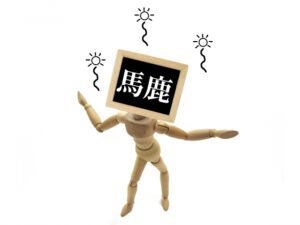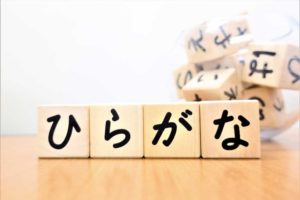Reference from the Agency for Cultural Affairs
- English subtitles -
Japanese form
- Sentence structure
Next, we will study the composition of sentences.
saru ha banana wo taberu.
主語 述語
Subject Predicate
(The monkey eats a banana.)
Let’s take a look at the sentence
“saru” is the subject.
“taberu” is a predicate.
Japanese sentences have a predicate at the end.
So the end of the sentence is important.
There are three sentence forms.
Noun sentences, verb sentences, and adjective sentences.
The noun sentence is “watashi no ane wa isya desu(My sister is a doctor.)”
It ends with a noun like.
The verb sentence ends with a verb, such as “watashi wa 5 ji ni oki masu(I get up at 5 o’clock.)”
The adjectives end with an adjective, such as “watashi no kaban wa hurui desu(My bag is old.)”
Noun sentences, verb sentences, and adjective sentences have affirmative, negative, non-past, and past, and the end of each sentence changes.
Noun sentences and adjective sentences have the same form.
The form of “noun sentence” changes to “watasi wa isha desu(I’m a doctor.)”, “watasi wa isha dewa arimasen(I’m not a doctor.)”, “watasi wa isha desita(I was a doctor.)”, and “watasi wa isha deha nakatta(I wasn’t a doctor)”.
The form of “Na adjective” changes to “sizuka desu(quiet)”, “sizuka jyanai desu(not quiet)”, “siazuka desita(quiet)”, “sizuka jyanakatta desu(not quiet)”.
The forms of “I adjectives” are “hurui desu(old)”, “huruku nai desu(not old)”, “huru katta desu(old)”, “furuku nakatta desu(not old)”, and the verb sentences are “okima su(wake up)”, “okima sen(do not wake up”, “okima sita(woke up)” “okima sen desita(did not wake up)”.
Verbs can take other forms besides “masu”, “nmasen”, “masita”, and “masendesita”.
For example, the verb “nomimasu” changes its form to “nomu”, “nonde” and “nomanai”
And it has various meanings.
文はそれぞれ肯定形と否定形、非過去と過去があります。
肯定形 Affirmative | 否定形 Negative | |
非過去 Non-past | 例: です | じゃないです |
過去 Past | でした | じゃなかったです |
- Japanese subtitles -
日本語の形
2、文の構成
次に文の構成について勉強します。
猿が バナナを 食べます。
主語 述語
Subject Predicate
の文を見てみましょう
「猿」が主語です。
「食べます」は述語です。
日本語の文は述語が最後にあります。
ですから文の最後は大切です。
文の形は3つあります。
名詞文と、動詞文と、形容詞文です。
名詞文は、「姉は医者です。」の様に名詞で終わります。
動詞文は、「私は5時に起きます。」、のように動詞で終わります。
形容詞分は、「私のカバンは古いです。」、のように形容詞で終わります。
名詞文も、動詞文も、形容詞文も、肯定・否定・非過去・過去があり、それぞれ文末が変わります。
名詞文と形容詞文は形が同じです。
「名詞文」の形は、「医者です」、「医者じゃないです」、「医者でした」、「医者じゃなかったです」に変わります。
「な形容詞」の形は、「静かです」、「静かじゃないです」、「静かでした」、「静かじゃなかったです」、に変わります。
「い形容詞」の形は、「古いです」、「古くないです」、「古かったです」、「古くなかったです」、動詞文の形は、「起きます」、「起きません」、「起きました」、「起きませんでした」、に変わります。
動詞は、「ます」、「ません」、「ました」、「ませんでした」、の他にも形が変わります。
例えば飲みますと言う動詞は、「飲む」、「飲んで」、「飲まない」のように形が変わります。
そして、いろいろな意味を表します
If you have any questions, ask them for free! ➡ Japanese Question Form

Your tutor Your time Your location
Some students say, “It would have been difficult for me to master Japanese without HH JapaNeeds.” Because they are too busy to schedule, or because there is no Japanese language class nearby. HH tutors are in direct contact and are literally your personal tutor.
Individual consultations such as not being able to decide the class time due to work reasons or wanting to study at the desired place can be decided directly with the teacher.

Aho meaning and Baka meaning in Japanese !
There are a number of words commonly used in Japan that have very similar meanings. Among them, one that is

Differences in Work Attitudes Between Japanese and Foreigners
Even among people of the same nationality, there are differences in the way of thinking, and these differences are even

How to become a foster parent for an abandoned pet in Japan
In Japan, puppies and kittens are displayed and sold at pet stores. In the West, such a system is rarely

Hiragana
Japanese has no “tone” at all. ひらがな 日本語を学ぶための最初のステップは、アルファベットを学ぶことです。または、少なくとも、その言語に存在する音を学ぶために。他の多くのアジア言語のように、日本語には「声調」はまったくありません。アルファベットには、後で説明する2つの例外しかありません。日本語のアルファベットには文字は含まれていませんが、代わりに文字が含まれており、技術的にはアルファベットではなく文字セットです。下の表の文字はひらがなと呼ばれています。ひらがなは、日本語の主要なアルファベットまたは文字セットです。日本語には、他に2つの文字セットがあります。後で説明する漢字(漢字)と、主に外国語に使用される別のアルファベット/文字セットのカタカナです。カタカナについてはレッスン2で説明します。ひらがなのすべてのキャラクターを覚えるまで、先に進むのを待たないでください。他のレッスンを続けながら、それらを学びましょう。 日本語には5つの母音があります。 (a)、「ahh」と発音、(i)、「eat」では「e」のように発音、(u)、「soon」では「oo」のように発音、(e)、「elk」では「e」のように発音、および(o)、「oh」と発音します。 (n)を除いて、すべてのひらがな文字はこれらの母音の1つで終わります。英語に似ていない唯一の「子音」は日本語の「r」です。 「d」、「r」、「l」の組み合わせのように少し「巻かれ」ています。 HH JapaNeedsYour tutor. Your





